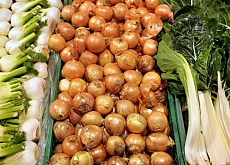
Consumers lose appetite for organic food

Organic farmers have been hard hit by increased competition in the Swiss food sector. Experts tell swissinfo they will have to adapt just to maintain market share.
Turnover was down 0.5 per cent last year to SFr1.183 billion ($950 million), accounting for three per cent of the food market. And there were 2.6 per cent fewer organic farms.
The Swiss are still the world’s biggest buyers of organic products, spending SFr160 per person annually.
But Otto Schmid of the Swiss Research Institute of Organic Agriculture says that could change if the organic industry continues with a business as usual approach.
He says farmers face a number of challenges, a key one being the arrival in the country of foreign discount supermarkets, such as the German retailer, Aldi, and the French chain, Carrefour.
“There is pressure on price and many believe that the sector is over-regulated,” Schmid says, adding that this could compel retailers to “import cheaper organic produce from abroad”.
He predicts that eventually organic farmers will no longer be able to charge higher prices unless it can be scientifically proven that organic tastes better and is more nutritional. There is also a need to communicate to the consumer exactly why organic food is more expensive.
Bleak future?
However, Bio Suisse – the umbrella organisation for organic farmers – is quick to refute any suggestion that the future is anything but rosy. Its annual report mentions the recent success of Coop, the country’s second largest supermarket chain, in marketing regional delicacies in the shops close to where they are produced.
This range, the organisation believes, will fuel growth in the organic market and ensure jobs in sparsely populated areas, as the products are not only sourced but often processed in the same region as well.
Indeed Coop played a historic role in bringing organic products to Swiss consumers. It was the first supermarket chain to stock organic groceries 13 years ago. “The availability of these products in the supermarket led to a higher acceptance among consumers,” says Schmid.
Coop’s efforts have left it with a 50 per cent market share. Rival Migros lags behind with 24.7 per cent.
“At the beginning, many saw Coop’s commitment to humans, animals and the environment as a marketing gag but it has since proved that this is central to its strategy,” says Christian Waffenschmidt, project coordinator of the supermarket’s own organic line, Naturaplan.
Big business
The supermarket now stocks 1,400 food items bearing the Bio Suisse label, the most popular of which is fresh produce. And it intends to continue its commitment as a way of distinguishing itself from its competitors and currying favour with customers.
However, Schmid warns organic farmers against being too dependent on the big chains. “There is growing competition from non-organic products in general, including non-organic premium labels,” says Schmid.
He referred to a Migros range, which gives the false impression of being organic and produced by mountain farmers. Such ranges, he says, “cannibalise” organic goods.
However, Coop disagrees that its own premium non-organic label has had the same effect.
“We see no significant cannibalisation of organic products by [the premium label]. The [latter] is very well established,” Waffenschmidt says.
As for the future, Coop is committed to extending its range and improving its communication especially as consumer demand for tasty, ecologically-produced products is on the rise.
Schmid adds that the Swiss can learn from Austria where the organic market also went through a similar stagnation before revitalising itself.
“Austria has developed in the last year, with strong exports… and programmes such as getting organic food into public canteens – in Vienna a certain percentage of such canteens have to buy organic products.”
swissinfo, Faryal Mirza
Currently 10-15 per cent of Swiss households buy organic regularly, mostly in German-speaking Switzerland, spending SFr160 per head annually on such products.
Organic foods have a 3% share of the market.
Switzerland’s biggest food retailer, Migros, sold SFr300 million of organic-certified products in 2005.
The leader was Coop with sales of SFr591 million.
Bio Suisse is celebrating its 25th anniversary this year. The umbrella organisation represents 33 organic farming associations.
There are around 6,300 farms certified by Bio Suisse – or 11% of the total number of farms in the country.
To receive certification, farms must ensure humane treatment of livestock, renounce genetically-modified feed or crops, and the use of chemical or synthetic herbicides and insecticides.
They are also subject to unannounced inspections.

In compliance with the JTI standards
More: SWI swissinfo.ch certified by the Journalism Trust Initiative

























You can find an overview of ongoing debates with our journalists here . Please join us!
If you want to start a conversation about a topic raised in this article or want to report factual errors, email us at english@swissinfo.ch.